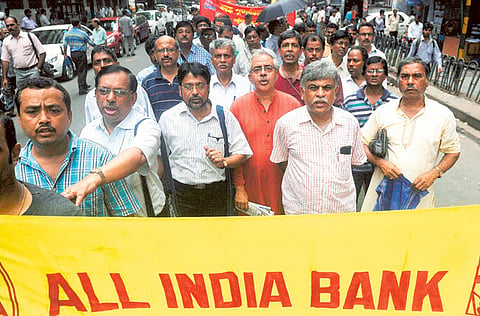Bank strike paralyses Indian businesses
Rs300b loss to the economy estimated as a million bank employees walk out

Mumbai: Almost a million bank employees across the country brought normal banking services to a standstill and inconvenienced millions of customers as they continued their second day of strike Thursday to protest against banking sector reforms and outsourcing of services to the private sector.
“The nationwide strike was a thunderous success. The clearing of cheques, handling of cash across the counters came to a grinding halt,” said Vishwas Utagi, Secretary, All India Bank Employees’ Association (AIBEA). In Mumbai, more than 10,000 bank employees held a mass meeting to protest against the amendment to the banking laws. With the government “denying” any dialogue with the United Forum of Bank Unions (UFBU), he said the mood of employees was one of anger and frustration.
With normal banking operations, including cash transactions, cheque clearances, foreign exchange dealings being affected, revenue losses to the economy was high stated the Associated Chamber of Commerce and Industry of India (Assocham) which put the loss for the two-day strike to be around Rs300 billion (Dh19.88 billion). “Already the complete halt of banking transactions following UFBU’s decision to go on strike has resulted in massive loss to the banks themselves and the national economy,” said D.S. Rawat, Secretary General, Assocham. Cheques have not been cleared, funds held back and corporate India has lost interest on uncleared cheques, he said.
The worst affected were business people depending on bank transactions and those who are not tech-savvy to make use of online banking for national electronic fund transfers, make fixed deposits or use e-mails. Long queues of customers could be seen at many ATMs across Mumbai to withdraw cash.
There are about 87,000 branches of public sector banks, employing over one million people. The PSU banks which operate 63.000 ATMs, control about 75 per cent banking business in the country. According to the AIBEU, the striking employees and officers work in “27 PSUs including State Bank of India, 12 old generation private sector banks and eight foreign banks like HSBC, Standard Chartered Bank, CITI Bank etc. who have gone on two-day nationwide strike.”
Utagi said UFBU is opposed to the recommendations of the Khandelwal Committee which wants to “snatch away the hard won rights of the bank employees through the process of collective bargaining.” Bank employees are also vociferously opposed to the outsourcing of permanent jobs through banking correspondents and contract employees. Apart from opposing reforms, the UFBU is also demanding regulated working hours, a five-day working week and revision of pensions.
A senior officer of Bank of Baroda told this paper, “We are not being given a five-day week as this would cause a loss to business and businessmen. But no one is considering our demands. We are forced to strike even though we will lose two days’ salary.”
The unions say that “the strike action is in the national interest to protect the character of public sector banks. The need of the hour is to expand in every village of our country as it has been proved that only public sector banks are the backbone of our economy.”
Sign up for the Daily Briefing
Get the latest news and updates straight to your inbox



